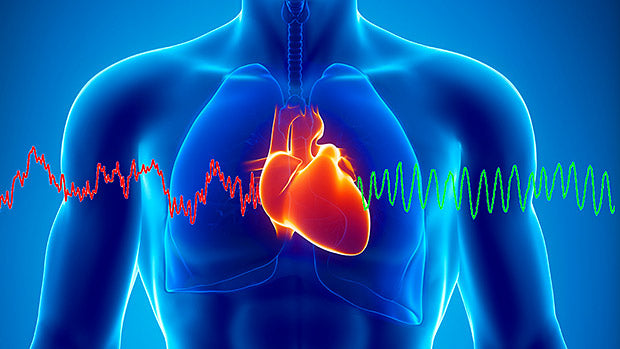
10 Oct 2024
Understanding Heart Rate Variability: A Key Indicator of Fitness
Heart rate variability (HRV) is gaining traction in the fitness community, but what does it really mean, and why should it matter to you? In this blog post, we’ll explore what HRV is, its significance for your fitness journey, and how you can improve it. Plus, we’ll introduce you to our fitness app that makes tracking HRV easier than ever!
What is Heart Rate Variability?
Heart rate variability refers to the time variations between each heartbeat. While many people think heart rate is a steady number—like 60 or 70 beats per minute—it's actually dynamic and fluctuates based on various factors like stress, activity level, and overall health.
The Science Behind HRV
HRV is regulated by the autonomic nervous system (ANS), which has two key branches:
- **Sympathetic Nervous System (SNS)**: Known as the "fight or flight" system, it prepares your body for action.
- **Parasympathetic Nervous System (PNS)**: Often called the "rest and digest" system, it promotes relaxation and recovery.
A higher HRV indicates a well-balanced ANS, meaning your body can efficiently switch between stress and recovery modes. Conversely, a lower HRV can suggest stress, fatigue, or potential overtraining.
Why is HRV Important for Fitness?
1. **Performance Indicator**: Athletes utilize HRV to assess their readiness for training. A higher HRV usually means your body is primed for intense workouts, while a lower HRV may signal the need for recovery.
2. **Stress Management**: Monitoring HRV helps you understand how your body responds to stress. By identifying patterns, you can take proactive steps to manage stress effectively.
3. **Recovery Monitoring**: Tracking HRV after intense workouts provides insights into your recovery status. A stable or increasing HRV over time indicates your body is recovering well.
How to Measure HRV
Measuring HRV can be done through various devices and apps. Here are a few options:
- **Wearable Fitness Trackers**: Many smartwatches and fitness bands offer HRV tracking features.
- **Heart Rate Monitors**: Chest straps and wrist monitors can deliver accurate HRV readings.
- **Mobile Apps**: Numerous apps analyze your heart rate data and provide HRV metrics.
For the best results, measure your HRV first thing in the morning while still at rest.
Tips for Improving Your HRV
1. **Prioritize Sleep**: Quality sleep is crucial for recovery and can significantly enhance your HRV.
2. **Stay Hydrated**: Dehydration can adversely affect your heart rate and HRV, so make sure to drink enough water.
3. **Practice Mindfulness and Relaxation Techniques**: Activities like yoga, meditation, and deep breathing exercises can help reduce stress and improve HRV.
4. **Regular Physical Activity**: Engaging in consistent exercise, especially aerobic workouts, can boost your HRV over time.
5. **Limit Alcohol and Caffeine**: Excessive consumption of these substances can lead to fluctuations in your heart rate and lower HRV.
Join Our Fitness App
Ready to take your fitness journey to the next level? Our fitness app not only tracks your heart rate but also offers personalized insights and recommendations to optimize your training and recovery. With features like guided workouts, nutrition tracking, and progress monitoring, you’ll have everything you need to achieve your fitness goals right at your fingertips.
Why Our App?
- **Easy HR Tracking**: Get daily insights into your HR and understand how your body is responding to training and stress.
- **Customized Plans**: Receive personalized workout and recovery plans tailored to your HR data.
Don’t leave your health and fitness to chance! Sign up for our app today and start unlocking the benefits of heart rate variability. Your body will thank you!
Conclusion
Heart rate variability is a powerful tool for enhancing your fitness journey. By understanding and monitoring your HRV, you can make informed decisions about your training and recovery. Start tracking today with our app and unleash your body’s potential!



